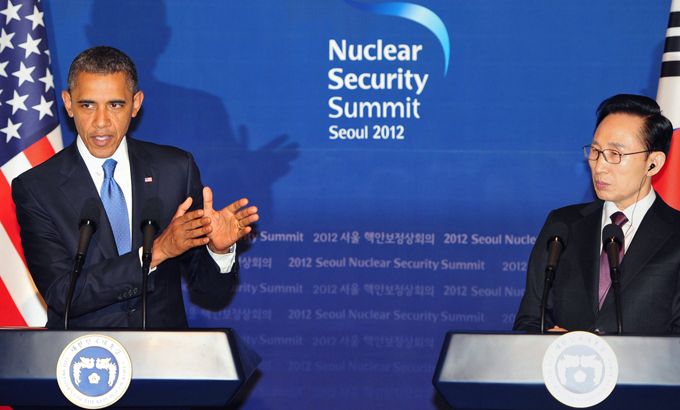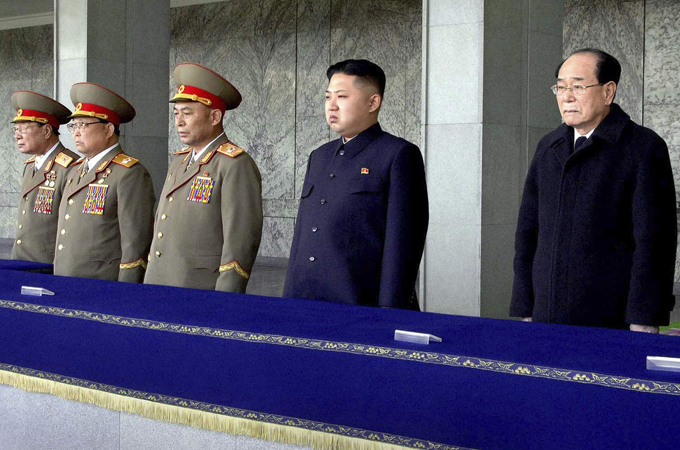Obama warns N Korea over rocket launch
After visiting demilitarised zone, US president says Pyongyang’s rocket plan would deepen country’s isolation.

US President Barack Obama has visited US troops stationed on South Korea’s border with North Korea in a show of solidarity with Seoul, ahead of a global summit there on nuclear security.
Obama flew on Sunday by helicopter to a US base on the edge of the Demilitarised Zone (DMZ) to meet troops and take a first-hand look at one of the world’s most heavily fortified frontiers.
Obama and his South Korean counterpart Lee Myung-bak held a joint press conference in Seoul later in the day where they once again called on North Korea to halt its nuclear weapons programme.
Obama also criticised North Korea’s intention to conduct a rocket launch next month, saying: “This would constitute a direct violation of Pyongyang’s own commitments and its international obligations.
“Moreover it would only deepen North Korea’s isolation, damage further its relations with its neighbours, and seriously undermine prospects of future negotiations. North Korea will achieve nothing by threats or provocations.”
North Korea announced this month that it plans to send a satellite into orbit, a move Washington has condemned as a violation of its promise to halt long-range missile launches, nuclear tests and uranium enrichment.
Obama warned that a deal to resume stalled food aid to the North, agreed earlier this month, could be jeopardised if Pyongyang goes ahead with the launch.
‘Rewarding bad behaviour’
Obama also said that China’s actions of “rewarding bad behaviour (and) turning a blind eye to deliberate provocations” were obviously not working.
The US president said he would raise the matter at a meeting with Chinese President Hu Jintao on Monday.
“I believe that China is very sincere that it does not want to see North Korea with a nuclear weapon,” he told a news conference in Seoul before a global summit on nuclear security.
“But it is going to have to act on that interest in a sustained way.”
Obama’s comments were his strongest push yet to get China to use its influence to rein in its ally North Korea and dovetails with recent calls for Beijing to meet its responsibilities as a rising world power.
China is host to the six-party talks which also involve the two Koreas, the US, Japan and Russia.
Defence capabilities
South Korea’s Lee said: “If North Korea gives up its pursuit of nuclear weapons and missile development and instead chooses a path towards peace and co-operation, our two countries will work together, along with the international community, to help improve the lives of the people in North Korea and provide necessary assistance that will help North Korea open up a new era.”
“President Obama and I agreed that we will continue to enhance and strengthen our combined defence capabilities and at the same time firmly respond to any threats and provocations from the North,” he added.
The White House cast Obama’s first visit to the DMZ, the four-kilometre wide strip that has divided the peninsula since the end of the Korean War in 1953, as a way to showcase the strength of the US-South Korean alliance and thank some of the more than 20,000 US troops still deployed there.
“You guys are at freedom’s frontier,” he told about 50 troops. “The contrast between South Korea and North Korea could not be clearer, could not be starker, both in terms of freedom and in terms of prosperity.”
Although the conflict between North Korea and South Korea has effectively been frozen for nearly 60 years, the countries remain technically at war because their conflict ended with a truce agreement rather than a formal peace treaty.
Obama will join more than 50 other world leaders for a follow-up to the inaugural nuclear security summit he organised in Washington in 2010 to help combat the threat of nuclear terrorism.
While the issues of North Korea and Iran are not on the guest list or the official agenda, they are expected to be the main focus of Obama’s array of bilateral meetings on the sidelines of the two-day summit.
 |
| Kim Jong-un attends a ceremony to mark the 100th day since the death of his father, Kim Jong-il [Reuters] |
Reporting from Seoul, Al Jazeera’s Harry Fawcett said: “The White House says nuclear terrorism is the number one threat to US national security. This summit is the half-way point of a four-year process with an ambitious goal of trying to lock down nuclear materials around the world.
“[North Korea] will be talked about extensively. There are a number of bilateral meetings happening.”
A South Korean military spokesman told the AFP news agency on Sunday that North Korea had moved the main body of a rocket to a launch site in the country’s northwest.
The North has announced it will fire the rocket to put a satellite into orbit between April 12-16 to mark the 100th anniversary of the birth of founding President Kim Il-sung.
Obama’s visit to the DMZ also coincided with the end of the 100-day mourning period for the North’s long-time leader, Kim Jong-il, who died in December.
Flags flew at half-mast in “every nook and corner” of the country and sirens and whistles sounded at midday, state media said. North Koreans “overcome with grief” observed three minutes’ silence.
The state’s new young leader, Kim Jong-un, the third member of the Kim family to rule the state, bowed before a portrait of his father at the palace where he lies in state.